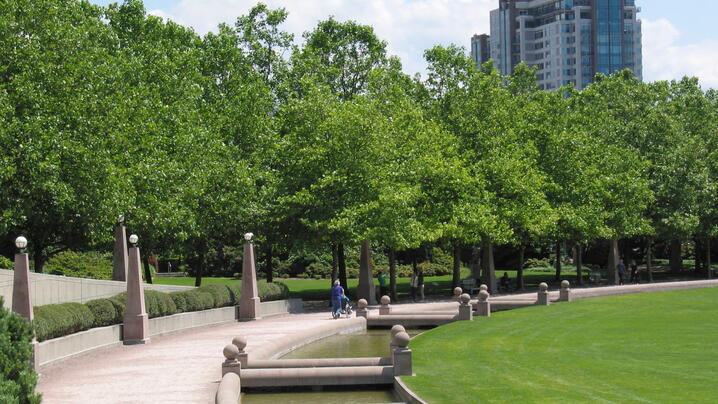
by Rebecca DeSantis, content and engagement coordinator, ICMA
When the spring foliage starts to bloom, we are reminded of the natural resources that help to keep our communities healthy. Two United Nations observances help us kick off spring by celebrating the environment that keeps our air, soil, water, and people healthy.
International Day of Forests on March 21 brings awareness to the importance of trees in building sustainable communities. Forests have a vital role to play in some of the biggest challenges we face today, such as addressing climate change, eliminating hunger, and keeping urban and rural communities sustainable.
World Water Day on March 22 reminds us that water is an essential building block of life. It is more than just essential to quench thirst or protect health; water is vital for creating jobs and supporting economic, social, and human development.
Issues related to water and forest management are important for local governments working toward sustainable development. In some communities, the main water challenges can range from making sure all residents have access to clean water to dealing with the effects of drought on local water supplies. In both rural and urban communities, investing in forests and forestry education can help ensure that policy makers and local communities can work properly to halt deforestation and restore degraded landscapes. Many communities are tackling these issues using technology, engagement, and innovative solutions.
One of the ICMA Local Government Excellence Awards, the Community Sustainability award, recognizes innovative programs or processes that creatively balance a community’s social, economic, environmental, and cultural needs. The 2018 winners exemplify the wide range of programs and initiatives that are being implemented nationwide to create healthy communities. Here are some tips from last year's winners, Kenilworth, Illinois; Cedar Hill, Texas; and Raleigh, North Carolina, and a few ICMA resources that can help you build a sustainable community in your area.
1. The 'big picture vision' must guide planning and implementation.
Project and program champions can be used at all levels to help further the vision. It is also important to align the vision with top management and elected officials to gain widespread support.
The 2019 Prediction on Sustainability in Local Government, by Jane Brautigam, city manager, Boulder, Colorado, offers suggestions on the "big picture" of sustainability and tips to ensure a successful project.
2. Consider a variety of approaches, especially if trying something new.
It is helpful to think outside of the box when thinking about sustainability programs. If an approach isn’t working, don’t be afraid to ask for help and change the original plans.
The Implementing a Green Infrastructure Plan Checklist offers a six-step plan for successful sustainability planning in a way that leverages natural environmental patterns.
3. Achieving public buy-in for environmental sustainability must be a priority.
Involving and engaging community stakeholders, particularly builders and land developers, will help ensure support and to move the project forward.
This Tree City USA: Building Greener Communities blog offers a great example of involving a community to achieve sustainability.
4. Publicize successful results of a project as much as the process is publicized.
Share successes to show residents how small changes can have a big impact. If staff members are not hearing from residents about the project or program, the community may not be reaching its intended audience.
This Tackling Sustainability Challenges: U.S. Fellows in Asia article shows how young leaders from U.S. local governments learned about addressing sustainability challenges from successful programs abroad.
New, Reduced Membership Dues
A new, reduced dues rate is available for CAOs/ACAOs, along with additional discounts for those in smaller communities, has been implemented. Learn more and be sure to join or renew today!
